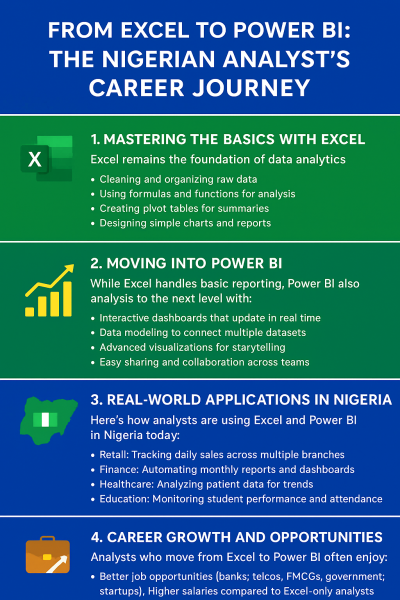
SOPHIA OLISE
 Data Analysis
Data Analysis
 0 comment
0 comment
 04 Sep, 2025
04 Sep, 2025

For many Nigerian professionals, the data analytics journey begins with a familiar and trusted tool: Microsoft Excel. For years, Excel has been the backbone of countless businesses, used for everything from managing sales reports to tracking departmental budgets and performing basic financial analysis. Its ubiquity and user-friendly interface have made it the go-to tool for a generation of professionals.
However, as Nigeria’s economy grows and becomes more data-driven, a new standard is emerging. Organizations are no longer satisfied with static reports and simple charts. They need real-time, interactive insights to make faster, more informed decisions. This demand is driving a significant career shift, and for the savvy Nigerian professional, the next logical step is a transition to Power BI.
This career journey from Excel to Power BI is more than just learning a new tool, it’s about unlocking a world of opportunities in Nigeria’s fast-growing data ecosystem.
Before moving on, it’s crucial to acknowledge the foundational skills that Excel provides. Far from being obsolete, Excel remains a critical tool. It teaches you the essential discipline of data handling. Mastering Excel gives you a strong grasp of:
Almost every Nigerian business, from small startups to large corporations, still requires some level of Excel proficiency. It is the best place to start and serves as a solid base for future growth.
While Excel is excellent for individual tasks and basic reporting, it has limitations when dealing with large, diverse datasets. This is where Power BI, a more robust business intelligence tool, comes in. Transitioning to Power BI is a career upgrade that signals to recruiters that you can handle more complex data challenges.
Power BI takes your analysis to the next level by allowing you to:
For a professional in Nigeria, learning Power BI is not just about a new tool; it's a statement that you are equipped for the future of business analytics.
The combination of Excel and Power BI is a powerful one, and it is being applied to solve real-world problems in diverse Nigerian industries today.
This transition from static to dynamic analysis is what helps Nigerian businesses make data-backed decisions faster and more effectively.
Step 4: Career Growth and Opportunities
The professional who masters both Excel and Power BI is a highly valuable asset in the Nigerian job market. This dual proficiency leads to:
Your career growth doesn’t stop at Excel. If you want to stay competitive and secure a high-paying role in Nigeria’s job market, transitioning to Power BI is a must. At ECR Academy, we guide you step by step from Excel basics to advanced Power BI dashboards using practical, real-world projects from the Nigerian business landscape. Our structured curriculum and mentorship will give you the confidence to take on your next career challenge.
Whether you're starting or upgrading your tech skills, you can begin your learning journey with us today.
Review Affordable Tech Course with us at ECR Academy We provide the hands-on, project-focused training you need to master tech skills like Digital Marketing, Web development, Data Analysis, Cybersecurity.
Build Comprehensive Digital Solutions with ECR Technology Services Limited Let us help you bring your brand, business, or idea online with professional digital solutions such as secure, responsive websites, robust mobile applications, high-impact digital marketing templates, and specialized Learning Management Systems (LMS).
Contact Us Today:
Frequently Asked Questions
Yes. Almost every company still uses Excel for daily reporting. However, pairing Excel with Power BI gives you a competitive advantage.
With consistent practice, most learners can become confident in 2–3 months.
No. Power BI is user-friendly, but learning SQL or DAX can enhance your skills.
Roles like Data Analyst, Business Analyst, Sales Analyst, and Reporting Specialist often require Power BI skills.
Yes. ECR Academy offers flexible online classes with mentorship to fit your schedule.
SOPHIA OLISE
Data Analyst
Olise Sophia Amarachi is a passionate and purpose-driven data analyst and digital skills advocate based in Nigeria. With a strong foundation in Excel, Power BI, and SQL, she empowers others—especially young people and corps members—through practical training, tech mentorship, and values-based leadership. Sophia’s journey into data analysis began during her NYSC year in Abia State, where she committed herself to learning and growing from scratch. Today, she shares her knowledge through online classes, challenges, and hands-on projects, including dashboards and reports that translate complex data into clear insights.
0 comment